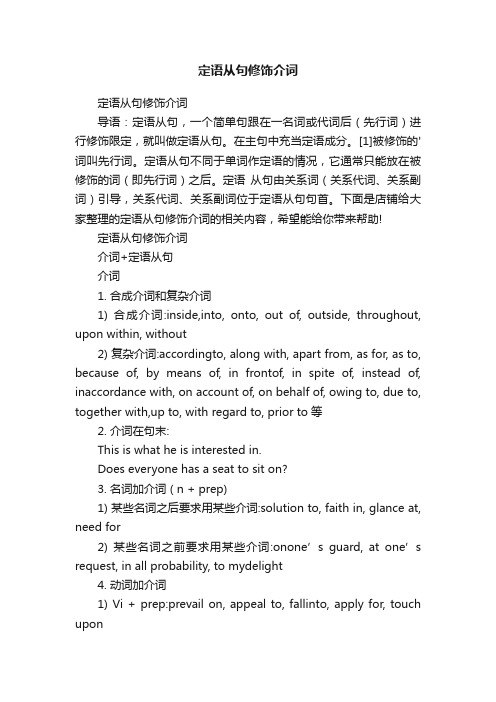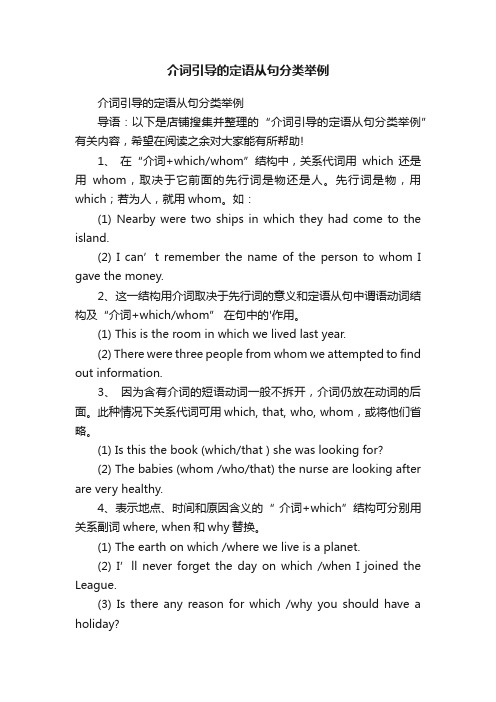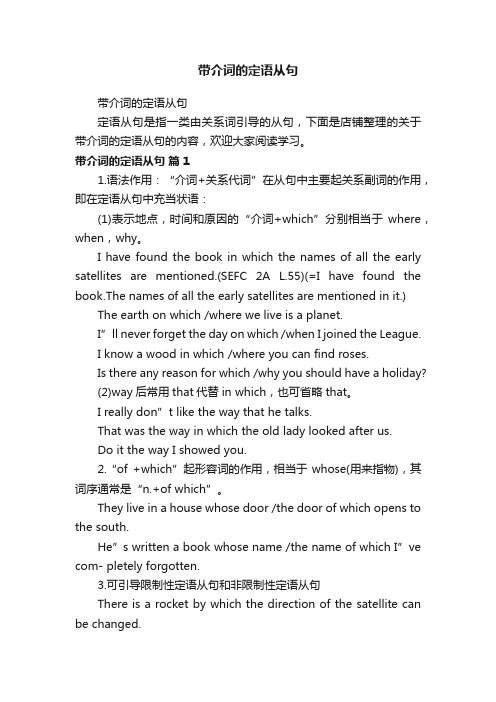介词定语从句
定语从句介词知识点总结

定语从句介词知识点总结介词在定语从句中的使用分为两种情况:一种是介词前置,即介词位于定语从句中引导词的前面;另一种是介词后置,即介词位于定语从句中引导词的后面。
在具体的语境中,要根据不同的情况选择恰当的介词,并确保介词的使用符合语法规则。
一、介词前置情况1. 时间介词的前置在定语从句中,表示时间的介词如at, on, in等通常放在从句的先导词之前。
例如:The day when we met for the first time is still vivid in my memory.(我们第一次见面的那一天在我的记忆中依然清晰)I will never forget the moment when I held my baby for the first time.(我永远不会忘记我第一次抱着我的宝宝的那一刻)2. 原因介词的前置表示原因的介词如because of, due to等也通常放在定语从句中引导词的前面。
例如:The reason why she didn't come to the party is because of her illness.(她没来参加派对的原因是因为生病了)The failure of the project was due to the lack of funding.(这个项目的失败是因为资金不足)3. 地点介词的前置在表示地点的定语从句中,介词如in, at, on等也通常放在引导词的前面。
例如:The place where we met for the first time is now a bustling shopping mall.(我们第一次见面的地方现在成了一个繁华的购物中心)I will never forget the city where I spent my childhood.(我永远不会忘记我度过童年的那座城市)4. 其他介词的前置除了表示时间、原因、地点的介词外,其他表示方式、比较、程度等概念的介词也通常放在定语从句中引导词的前面。
定语从句中的介词可提前的全部情况

定语从句中的介词可提前的全部情况关系代词whom或which在定语从句中作介词宾语时,介词可放在后面,也可提前构成介词+关系代词whom (先行词指人)/which(先行词指物)引导定语从句(这种方法更为正式)。
例: Mary is the girl whom I borrowed a book from. = Mary is the girl from whom I borrowed a book. 玛丽就是我向她借书的那个女孩。
Is this the room that/which he once lived in? = Is this the room in which he once lived? 这是他曾经住过的房子吗?常见的有以下几种情况:1. where=in/on which 例:This is the room where / in which he lives.这是他住的房间。
I can see the playground where / on which they do sports.我能看见他们进行运动的操场。
2. when= on/in/at which 例:I still remember the year when/ in which I joined the Party.我仍然记得入党的那一年。
I still remember the day when/on which I joined the Party. 我仍然记得入党的那一天。
I still remember the hour when/at which the rocket was launched.我仍然记得那个火箭发射的时刻。
3. why=for which 例:This is the reason why / for which he was killed.这是他被杀害的原因。
但下列情况下介词不能提前:⑴用who代替whom,用that代替which时,介词不能提前。
介词提前的定语从句

介词提前的定语从句在英语语法中,定语从句是一种常用的句子结构,用于修饰名词或代词。
它通过引导词(关系代词或关系副词)与先行词之间的关系来提供进一步的信息。
在定语从句中,我们通常将引导词放在句子的末尾。
然而,在某些情况下,我们可以将介词提前到定语从句的引导词之前,以达到一种更加自然和流畅的表达方式。
介词提前的定语从句的常见情况是在关系代词之前加上介词。
这样做的好处是使句子更加简洁明了,并且可以避免使用复杂的介词短语结构。
例如:1.The book on which I'm reading is very interesting.→The book I'm reading is very interesting.(我正在读的那本书非常有趣。
)2.The girl with whom I went to the party is my best friend.→The girl I went to the party with is my best friend.(我和她一起去参加派对的那个女孩是我最好的朋友。
)3.The restaurant in which we had dinner last night was expensive.→The restaurant we had dinner in last night was expensive.(我们昨晚吃饭的那家餐厅很贵。
)通过将介词提前,我们可以使句子更加简洁,并且更符合日常口语的表达习惯。
这种结构在口语和书面语中都非常常见,而且能够帮助我们更好地理解句子的含义。
需要注意的是,不是所有的介词都可以提前到定语从句的引导词之前。
只有一些常见的介词,如with、in、on、for等可以进行提前。
而其他一些介词,如to、at、from等则不能进行提前。
因此,在使用介词提前的定语从句时,我们需要根据具体的语境和常用表达习惯来判断是否适用。
介词后面加句子是什么从句

介词后面加句子是什么从句介词后面加句子是什么从句?这是一个语法问题,在英语学习中,介词后面可以接很多种从句,从简单的形容词从句到复杂的状语从句。
本文将从五个方面介绍下介词后面常常出现的从句。
1. 定语从句介词后面加上定语从句,常常用来修饰名词或代词,使得句子的意思更加明确。
例如:- The book on the table, which is about history, belongs to my brother.(在桌子上的那本书,是我弟弟的历史书。
)2. 名词性从句名词性从句包括主语从句、宾语从句和表语从句。
它们可以用在介词后面,例如:- I am not sure about what to say.(我不确定该说什么。
)- The fact that he is my brother does not mean I have to help him.(他是我弟弟并不意味着我必须帮他。
)- She is interested in where he comes from.(她对他来自哪里感兴趣。
)3. 状语从句状语从句可以分为时间、地点、比较、条件、目的、结果、原因等多种类型,可以用在介词后面,例如:- We went to the concert after we had dinner.(我们晚饭后去了音乐会。
)- She was so excited that she jumped up and down.(她太兴奋了,跳来跳去。
)- He ran faster than I did.(他跑得比我快。
)- If it rains tomorrow, we will stay indoors.(如果明天下雨,我们就呆在家里。
)4. 定义性从句定义性从句就是用来给名词或代词下定义,可以用在介词后面。
例如:- The man to whom I spoke is my boss.(我跟他说话的那个人是我的老板。
定语从句介词提前用法

定语从句介词提前用法定语从句是英语中非常重要的一种语法结构,它可以用来修饰名词或代词,进一步描述或限定其所指的对象。
而介词提前则是定语从句中常用的一种表达方式,它可以使句子更加简洁明了,也更符合英语语言的表达习惯。
介词提前的用法可以通过以下例句来理解:1. The book on the table, which I borrowed from the library, is very interesting.这句话中,介词on被提前到定语从句的开头,修饰名词table。
定语从句的主语是I,谓语是borrowed,关系代词which指代的是book。
2. The girl in the red dress, whom I met yesterday, is my new neighbor.这句话中,介词in被提前到定语从句的开头,修饰名词dress。
定语从句的主语是I,谓语是met,关系代词whom指代的是girl。
3. The man with the beard, whose car was stolen, reported thetheft to the police.这句话中,介词with被提前到定语从句的开头,修饰名词beard。
定语从句的主语是car,谓语是was stolen,关系代词whose指代的是man。
通过以上例句可以看出,介词提前的用法可以使定语从句更加简洁明了,同时也可以使句子的语气更加自然流畅。
在实际应用中,我们可以根据需要灵活运用介词提前的用法,使句子更加优美。
除了介词提前,定语从句还有其他的表达方式,比如关系代词的省略、关系代词的替换等。
在使用定语从句时,我们需要注意以下几点:1. 关系代词的选择:在定语从句中,关系代词的选择要根据其在从句中所扮演的角色来确定。
比如,主语要用who或that,宾语要用whom或that,所有格要用whose等。
2. 关系代词的位置:在定语从句中,关系代词的位置要放在从句中所修饰的名词或代词之后,这样才能清晰地表达出其所指代的对象。
定语从句修饰介词

定语从句修饰介词定语从句修饰介词导语:定语从句,一个简单句跟在一名词或代词后(先行词)进行修饰限定,就叫做定语从句。
在主句中充当定语成分。
[1]被修饰的'词叫先行词。
定语从句不同于单词作定语的情况,它通常只能放在被修饰的词(即先行词)之后。
定语从句由关系词(关系代词、关系副词)引导,关系代词、关系副词位于定语从句句首。
下面是店铺给大家整理的定语从句修饰介词的相关内容,希望能给你带来帮助!定语从句修饰介词介词+定语从句介词1. 合成介词和复杂介词1) 合成介词:inside,into, onto, out of, outside, throughout, upon within, without2) 复杂介词:accordingto, along with, apart from, as for, as to, because of, by means of, in frontof, in spite of, instead of, inaccordance with, on account of, on behalf of, owing to, due to, together with,up to, with regard to, prior to等2. 介词在句末:This is what he is interested in.Does everyone has a seat to sit on?3. 名词加介词 ( n + prep)1) 某些名词之后要求用某些介词:solution to, faith in, glance at, need for2) 某些名词之前要求用某些介词:onone’s guard, at one’s request, in all probability, to mydelight4. 动词加介词1) Vi + prep:prevail on, appeal to, fallinto, apply for, touch upon2) Vt + O + prep:lay emphasis on, takeadvantage of等3) Vi + adv + prep:I don’t wish to break in on yourthoughts.The family came up against freshproblems.You’re not telling me the whole story.You’re holding out on me.She got off with him soon after she beganto work at the institution.4) Vt + O + adv +prep:You shouldn’t take your resentment out onme.We shouldn’t put the shortage down to badplanning.5. 形容词加介词about---anxious, careful, careless,certain, considerate, enthusiastic, guilty, happy, mad, particular, sad, sure,timid, unhappy, etcat---awkward, bad, clever,disappointed, disgusted, good, marvellous, quick, skilful, skilled, useless,weak, etcfor---convenient, eligible, grateful,homesick, hungry, necessary, noted, perfect, responsible, etc from --- evident,exempt, inseparable, safe, tired, etcin---deficient, expert, liberal, quick,rich, successful, weak, etc of---apprehensive, characteristic,critical, destructive, envious, hard, inconsiderate, impatient, dependent,jealous, positive, scared, sensible, short, sick, suspicious, typical, worthy,etc on---dependent, keen, intent, etcto---acceptable, accessible, agreeable,alive, attentive, blind, comparable, courteous, deaf, destructive, essential,favourable, hostile, indifferent, married, obedient, parallel, preferable,related, responsible, sensitive, suitable, unjust, etcwith---awkward, bored, careful,disappointed, generous,identical, ill, impatient, popular, sick, wrong, etc 【定语从句修饰介词】。
介词引导的定语从句分类举例

介词引导的定语从句分类举例介词引导的定语从句分类举例导语:以下是店铺搜集并整理的“介词引导的定语从句分类举例”有关内容,希望在阅读之余对大家能有所帮助!1、在“介词+which/whom”结构中,关系代词用which 还是用whom,取决于它前面的先行词是物还是人。
先行词是物,用which;若为人,就用whom。
如:(1) Nearby were two ships in which they had come to the island.(2) I can’t remember the name of the person to whom I gave the money.2、这一结构用介词取决于先行词的意义和定语从句中谓语动词结构及“介词+which/whom” 在句中的'作用。
(1) This is the room in which we lived last year.(2) There were three people from whom we attempted to find out information.3、因为含有介词的短语动词一般不拆开,介词仍放在动词的后面。
此种情况下关系代词可用which, that, who, whom,或将他们省略。
(1) Is this the book (which/that ) she was looking for?(2) The babies (whom /who/that) the nurse are looking after are very healthy.4、表示地点、时间和原因含义的“ 介词+which”结构可分别用关系副词where, when和why替换。
(1) The earth on which /where we live is a planet.(2) I’ll never forget the day on which /when I joined the League.(3) Is there any reason for which /why you should have a holiday?5、Of which可以代替whose 用来指物,其词序一般为“名词+ of which”(1) They live in a house whose door/the door of which opens to the north.(2) He has written a book whose name /the name of which I’ve completely forgotten.6、“复杂介词 in front of, at the back of, on the top of, in the middle of 等+ which”结构可引导非限制性定语从句。
带介词的定语从句

带介词的定语从句带介词的定语从句定语从句是指一类由关系词引导的从句,下面是店铺整理的关于带介词的定语从句的内容,欢迎大家阅读学习。
带介词的定语从句篇11.语法作用:“介词+关系代词”在从句中主要起关系副词的作用,即在定语从句中充当状语:(1)表示地点,时间和原因的“介词+which”分别相当于where,when,why。
I have found the book in which the names of all the early satellites are mentioned.(SEFC 2A L.55)(=I have found the book.The names of all the early satellites are mentioned in it.) The earth on which /where we live is a planet.I”ll never forget the day on which /when I joined the League.I know a wood in which /where you can find roses.Is there any reason for which /why you should have a holiday?(2)way后常用that代替in which,也可省略that。
I really don”t like the way that he talks.That was the way in which the old lady looked after us.Do it the way I showed you.2.“of +which”起形容词的作用,相当于whose(用来指物),其词序通常是“n.+of which”。
They live in a house whose door /the door of which opens to the south.He”s written a book whose name /the name of which I”ve com- pletely forgotten.3.可引导限制性定语从句和非限制性定语从句There is a rocket by which the direction of the satellite can be changed.We carefully studied the photos,in which we could see signs of plant disease.4.介词的选择(选择介词时须考虑下列情况)1)介词与先行词的习惯搭配There is no way in which it could be brought back to the earth.(in与way是习惯搭配)2)介词与定语从句中的动词,形容词的习惯搭配These are the wires with which different machines are connected.(be connected with是习惯搭配)The author with whom all of us are familiar will visit our compa-ny.(be familiar with是习惯搭配)3)同形的先行词,或定语从句中的动词,形容词表示不同的含义时,要根据其含义选用不同的介词。
- 1、下载文档前请自行甄别文档内容的完整性,平台不提供额外的编辑、内容补充、找答案等附加服务。
- 2、"仅部分预览"的文档,不可在线预览部分如存在完整性等问题,可反馈申请退款(可完整预览的文档不适用该条件!)。
- 3、如文档侵犯您的权益,请联系客服反馈,我们会尽快为您处理(人工客服工作时间:9:00-18:30)。
介词定语从句
介词定语从句
定语从句由关系词(关系代词、关系副词)引导,关系代词、关系副词位于定语从句句首。
下面是店铺为大家带来的介词定语从句!
一、“介词+关系代词”的用法
当关系代词在定语从句中作介词宾语时,我们通常用“介词+关系代词”引导定语从句。
如果指“人”,用“介词+whom”;如果指“物”,用“介词+which”。
例如:
Do you know the lady with whom our manager is talking in the office?
Where is the supermarket in which you bought the laptop last week?
使用“介词+关系代词”要注意以下几点:
(一)选用介词的依据:
(1) 根据定语从句中谓语动词的'搭配习惯(即固定短语)。
例如:
Yesterday we visited the West Lake for which Hangzhou is famous.
(2) 根据先行词的搭配习惯(约定俗成,不一定是短语)。
例如:
The old woman with whom you talked just now is a famous artist.
(3) 根据句子的意思来选择。
例如:
The naughty boy made a hole in the wall through which he could see what is happening outside.
(4) 表示“所有”关系或“整体中的一部分”时,通常用介词of。
例如:
I have about 20 books, half of which were written by Bing Xin, the famous writer.
(二)在定语从句中,含介词的短语动词不可拆开使用(短语拆开后含义发生变化),如look after, look for等。
例如:
The babies whom the nurses are looking after are very healthy.(正)
The babies after whom the nurses are looking are very healthy.(误)
(三)“of which / whom”有时可以用“whose+名词”结构来改写。
例如:
The building whose roof was damaged in the earthquake has been repaired.
=The building of which the roof was damaged in the earthquake has been repaired.
(四)当先行词为way并且定语从句中缺少状语时,通常用in which或that引导定语从句(in which或that可省略);如果定语从句中不缺少状语,则用关系代词引导(that 或which 可省略)。
例如:All of us disliked the way(in which / that)Tom settled the maths problem.
I don’t understand the way(that/which)the teacher explained to me.
(五)in that不可以引导定语从句,但可以引导原因状语从句。
例如:
She didn’t atten d the meeting in that / because she was seriously ill.
二、“介词+关系代词”与关系副词的转化
(1)当先行词表示地点,定语从句中缺少地点状语时,通常用关系副词where引导,此时也可选用表示地点的介词+which来代替关系副词where。
例如:
I visited the village where many children couldn’t go to school because of poverty.
=I visited the villag e in which many children couldn’t go to school because of poverty.
(2) 当先行词表示时间,定语从句中缺少时间状语时,通常用关系
副词when引导,此时也可选用表示时间的介词+which来代替关系副词when。
例如:
We’d better fix a date when we will practice speaking English next week.
=We’d better fix a date on which we will practice speaking English next week.
(3) 当先行词为reason,定语从句中缺少表示原因状语时,通常用关系副词why引导,此时也可以用for which来代替关系副词why。
例如:
Can you tell me the reason why you were late for school?
=Can you tell me the reason for which you were late for school?
下载全文。
